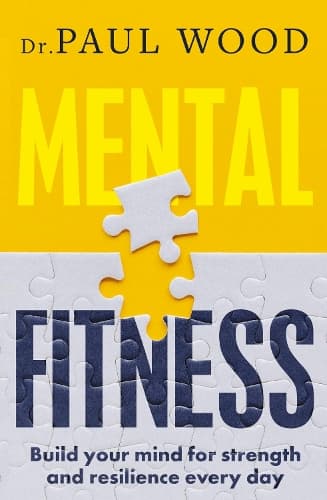Review: Mental Fitness: Build Your Mind For Strength and Resilience Every Day
Reviewed by Lauren Keenan
Dr Paul Wood has a remarkable story. When he was 18, he killed his drug dealer. Wood was then incarcerated – a story that could have been the opening chapter of a long, tragic tale of woe and recidivism, but isn’t.
Instead, Wood undertook what is described in his bio as a “journey from delinquent to doctor;” a “process of transformational change” to help others be their best selves. Mental Fitness: Build Your Mind for Strength and Resilience Every Day is Wood’s second book, following on from How to Escape From Prison (2019).
It is less about Wood himself than his previous book and more about us, the readers. The end result is an inspirational story about one man’s triumph over adversity, presented in such a way that the reader is enabled to use Wood’s tools and tricks to at least make a decent go at being the best they can be.
There is so much to learn from Mental Fitness that summarising it in a way that does it justice feels overwhelming. It is the sort of book that you buy then read, then after some time has passed read a second time, then a third – each time taking different things from it, based on where your life journey is up to at the time of reading. I fully expect to return to this book again for this exact reason.
Some of the tools contained in Mental Fitness felt new and fresh. Standouts included Wood’s descriptions and analysis of different kinds of stress, an incredibly useful list of core values and how to understand these, and an interesting overview of evolutionary theory and the human mind. Other parts of the book covered the things we all know deep down but largely ignore: eat right, move more, drink less and get more sleep. These were a timely reminder to me about the little things that make for a more successful life, as I read that section on the wrong side of midnight after an evening that included wine and too much ice-cream.
Wood’s own story of personal transformation is the thing that sets this book apart from others in this genre. The inspiration inherent in his journey cannot be underestimated. After all, if he can turn his life around so thoroughly, I can adopt some of his tools to improve my already privileged, relatively unremarkable middle-class life. Right? Especially as one of the best tips in this book (for me) was how to break down dreams into goals, then these goals into “ultimate” and “proximate” goals.
The idea of running a marathon is daunting. The idea of running 2kms is more achievable. Then, once you have done that, building the distances up over time until reaching that coveted 42.2kms and achieving your “ultimate goal,” with all the self-esteem benefits that gives you. However, I would have liked to see more acknowledgement that not every person can do everything. There are people who, for whatever reason, will never be able to run a marathon. But with such goals broken down into smaller chunks, at least Mental Fitness gives you the tools to try.
The book ends with a challenge. In one of the final pages, Wood writes: “[w]e’ve arrived at the most important part of the book. Because now it’s not about what I have to say. It’s all about what you are going to do.”
And herein lies the most confrontational part of the book – how we, the readers, can bridge the gap between theory and reality in applying his advice to our own lives. It’s much easier to sagely nod along when Wood recounts his own methods than it is to make meaningful changes yourself, especially if the myths we tell ourselves about who we are and what we can achieve are deep and enduring. The way Wood bounces this back to the reader certainly had me putting down the book with a mental list of things to change with immediate effect, however confronting that might be.
And maybe not drinking a glass of wine, eating too much ice-cream then reading self-help books after midnight is a good place to start.
Reviewed by Lauren Keenan
